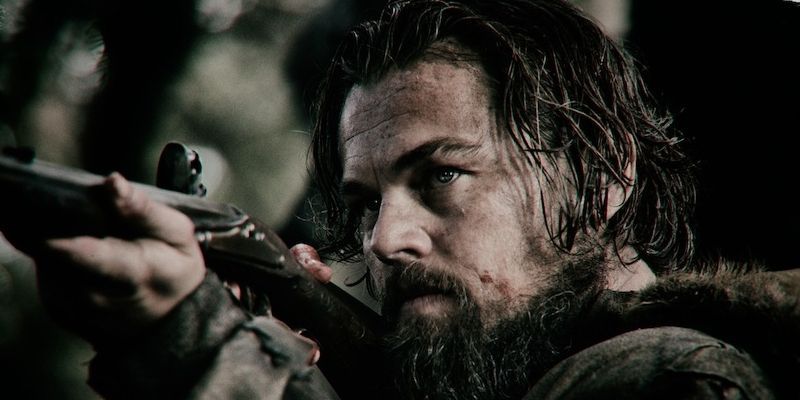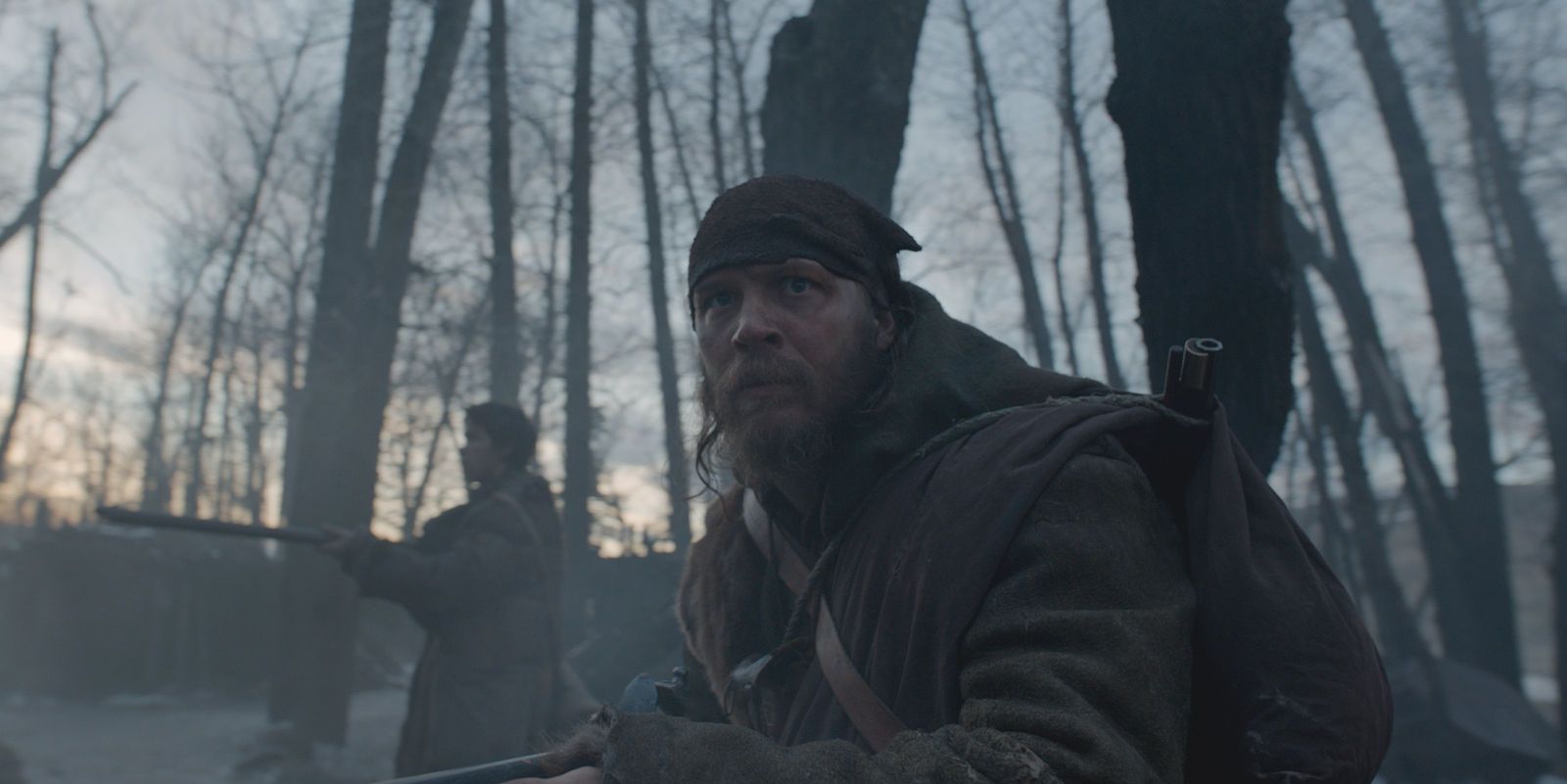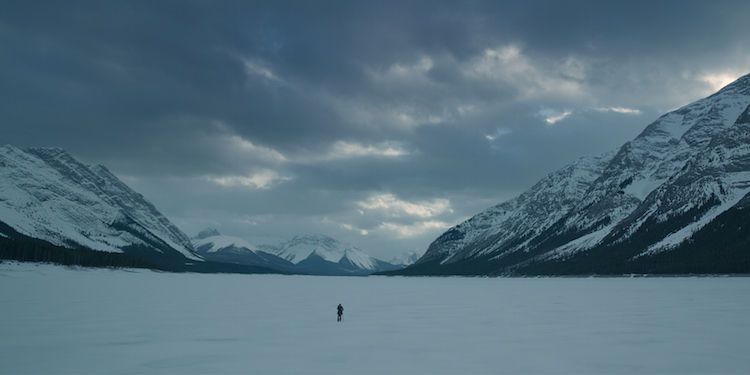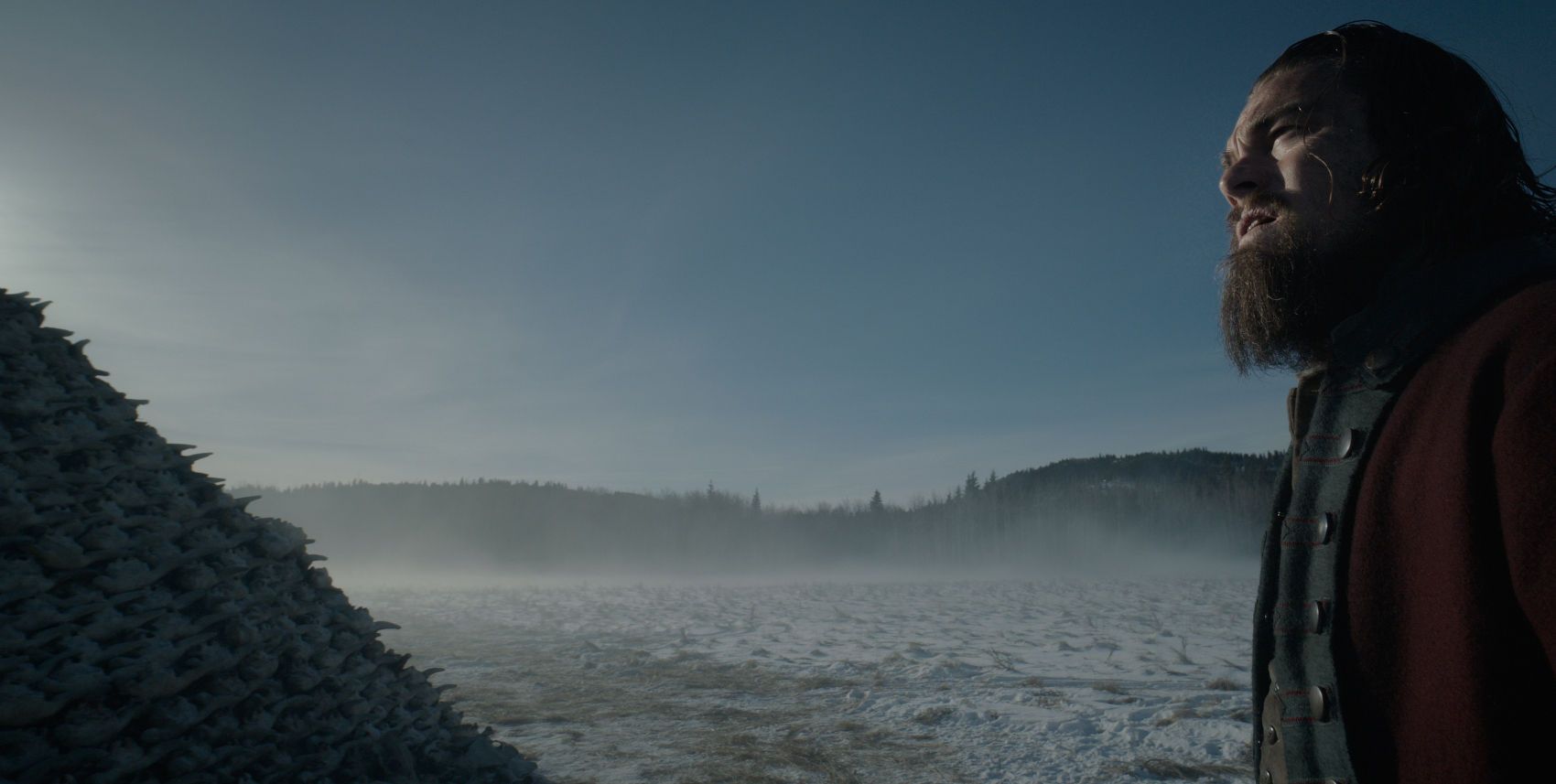The Revenant is an ambitious directorial and performance experiment that yields interesting, if not flawed, results.
The Revenant takes us back to the American frontier during the early 19th century, back when life (so to speak) in the unsettled lands of Montana and the Dakotas hung by the precarious threads of mankind's savagery, and nature's cruel whims. There we meet legendary American frontiersman and explorer Hugh Glass (Leonardo DiCaprio), who is leading a fur trapping expedition for Captain Andrew Henry (Domnhall Gleeson) and his company. The expedition takes a bad turn when the company is brutally attacked by a hunting party of Arikara Native Americans; bad turns to worse when, while on the run back to the fort, the company loses their best hope of survival, as Glass is mortally wounded in a grizzly bear attack.
Captain Henry orders two men - Jim Bridger (Will Poulter) and John Fitzgerald (Tom Hardy) - to stay behind with Glass's son, Hawk (Forrest Goodluck), to help the boy give his father proper burial, once the legendary frontiersman has finally died. However, fear of the Arikara pushes Fitzgerald to betray his oath and abandon Glass, half-buried in the frozen ground. But Glass doesn't die - on the contrary, he claws his way out of the grave, and sets to dragging himself - wounds and all - through all the savage terrain of the frontier, and the murderous Arikara still hunting him, back to the outpost where he can find Fitzgerald, and show him what it truly takes to bury a dead man.
Coming off his big Oscar win for Birdman, it would be easy to simply endorse the immense talent of director Alejandro González Iñárritu - easier still to add an endorsement for the physically grueling and dramatically rich performance of Leonardo DiCaprio. However, despite being technically impressive and propelled by a great central performance, The Revenant carries the rough signatures of an ambitious yet unrefined experiment; it's cold, technical, and precise in the way a lab experiment is, but fails to be as warm, richly textured and profound as the glorious painting it imagines itself to be.
One of the two biggest focal points of The Revenant is Iñárritu's choice in directorial style. After flitting the viewer from scene to associative scene in films like 21 Grams and Babel, Iñárritu has, in his recent films, chosen to go the opposite route, stretching scenes and sequences out in a style similar to his contemporary, Alfonso Cuarón. With The Revenant, Iñárritu stages long, guerilla single-take sequences, giving the film a frenetic pace, as well as the raw and visceral aesthetic (thanks in part to brilliant costuming and production design) of the adrenaline, panic, fatigue and pain, of frontier life - real emotion mined from actors and extras who ran countless loops of intricate sequencing. Battles on foot and horseback, boating runs, or even just real-time sequences of men dragging themselves bloody through the mud; Iñárritu creates many memorable - and no doubt, impactful - action-packed cinematic episodes worth watching - and in total, most of the episodes yield good results.
...And yet, at the same time, taken as a whole, The Revenant's episodic and experimental run of sequences ultimately leaves more seams and tags of artifice hanging off of it than the average motion picture. The film has a 0 to 100 interval pace; serene moments punctuated by artsy flitting imagery in the old Iñárritu tradition, snap right into the frantic, over-the-shoulder action sequences. Taken like that, it's hard not to see the starting and finishing lines of each major sequence - to practically hear the director yelling "Action! Action! Action!", "CUT! CUT! CUT!" before and after each big sequence. The Revenant, while entertaining from moment to moment, ultimately feels like film school on a much grander and more experienced scale - but with the same tendency to overindulge in technique and form, rather than substance and feel.
The same can be said of the script by Iñárritu and Mark L. Smith (The Hole, Vacancy), which layers a lot of impressionistic visual metaphors and motifs on top of the gritty survivalist story. It's debatable whether The Revenant actually earns the deeper resonance that it tries to create around DiCaprio's Hugh Glass - but what is clear is that notions of frontier violence and the larger message behind it (in regards to both man and god) don't quite feel at home in the same space as extended scenes of brutal animal attacks, rapes, murders, or disembowelment (to name just a few examples). Perhaps the filmmakers wanted to elevate Michael Punke's 2002 novel to the level of a Cormac McCarthy piece (i.e. an artistic mix of violence and prose), but they fall short of that marker by a few notches.
Performance-wise, The Revenant is a tour de force showcase for Leonardo DiCaprio, who spends a lot of the film onscreen alone, in the deep end of a grueling physical performance to which he fully commits. If you were impressed by the super-quaalude sequence in Wolf of Wall Street, then you're in for 2.5 hours of that same enjoyment; but beyond the physical aspect of the performance, there isn't really much to Hugh Glass (on script, or in portrayal) that is all that impactful. Regardless, awards talk for Leo are justified; many overlooked performers before him have finally received their Oscars for performances far less impressive than this one.
The supporting cast members encompass a lineup of familiar character actors, mostly doing familiar things. Tom Hardy isn't too far away from his grunting, mumbling performances in Mad Max, Dark Knight Rises or Lawless as a grunting, mumbling frontiersman. His version of John Fitzgerald does manage to emerge as one of the more layered and interesting characters in a narrative that mostly underserves character, so there is something to be said for what he bring to the table in non-verbal charisma.
Domnhall Gleeson brings the soulful naiveté that made him a tragic figure in Ex Machina, making Captain Henry a good-hearted but inept leader, trying to keep his fear in check. Will Poulter has been a standout in films like We're the Millers and The Maze Runner, but here he's rather forgettable as the hopelessly in-over his head Jim Bridger. Finally a cast of Native American and other character actors bring the rest of the frontier folk to convincing life.
In the end, The Revenant is an ambitious directorial and performance experiment that yields interesting, if not flawed, results. Whether it's the "best film of the year" is certainly debatable; it certainly could take the prize for "most grueling," or "most brutal," but that may not be quite what the arthouse crowd prepared their palettes for; while the action crowd may not embrace all the arthouse pauses along the bloody, mad-dash journey. But for those who don't need comfort in their movie going experience: you should take this wild ride.
The Revenant is now playing in wide release. It is 156 minutes long, and is Rated R for strong frontier combat and violence including gory images, a sexual assault, language and brief nudity.
Let us know what you thought of the film in the comment section below.





